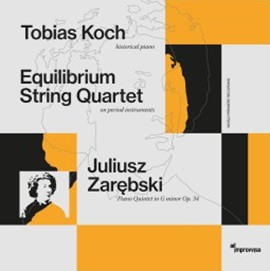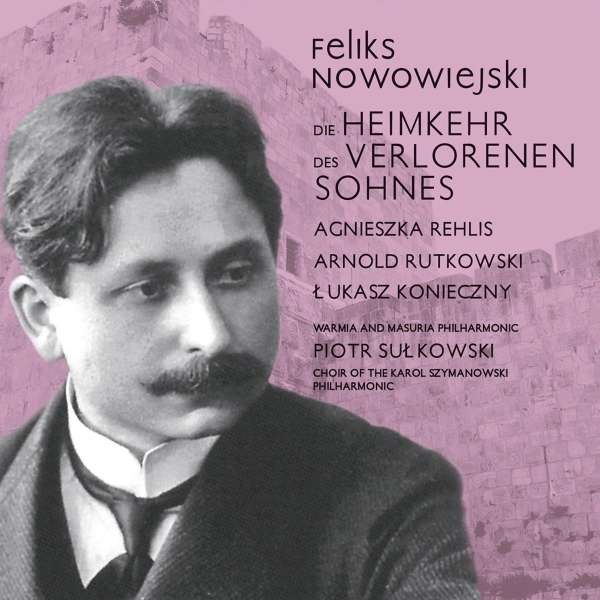Das 1902 uraufgeführte Oratorium Die Heimkehr des verlorenen Sohnes ist ein frühes Werk von Felix Nowowiejski (1877–1946). Er wurde dafür mit dem Giacomo-Meyerbeer-Preis ausgezeichnet. Von dem Preisgeld finanzierte der Komponist eine Studienreise durch mehrere europäische Länder, wo er unter anderem Antonin Dvorak, Gustav Mahler, Camille Saint-Saëns, Pietro Mascagni und Ruggero Leoncavallo kennenlernte.
Das Oratorium Die Heimkehr des verlorenen Sohnes entstand auf ein original deutsches Libretto des Berliner Violinisten, Komponisten und Librettisten Theobald Rehbaum (1835-1918). Das Gleichnis vom Sohn, der das Erbe verprasst, reumütig zurückkehrt und vom Vater freudig wieder aufgenommen wird läuft bei Rehbaum läuft etwas anders ab als in der Bibel. Anfangs ist der Vater nämlich gar nicht gewillt, dem reumütigen Sohn zu verzeihen. Doch dann tritt im zweiten Teil die Mutter auf, die bei Lukas keine Rolle spielt und sie bringt den Vater dazu, den Sohn wieder aufzunehmen.
Zunächst erklingt eine fast viertelstündige Ouvertüre, danach wird der Sohn vorgestellt, dann die Mutter und zuletzt der Vater. Der erste Teil enthält nur den Gesang des Sohnes, im zweiten Teil treten Sohn und Mutter auf und im letzten Teil Sohn, Mutter und Vater.
Leider enthält das Booklet der Dux-Produktion den Oratoriumstext nicht, so dass es nicht immer einfach ist, diesen zu verfolgen. Das gilt zumal für den säuerlich singenden Tenor Arnold Rutkowski, dessen monochromes Timbre mir ebenfalls nicht gefällt. Die Mezzosopranistin Agnieszka Rehlis hingegen singt textverständlich und sie differenziert den Text dramatischer als der phantasielos singende Rutkowski. Der Bass Lukas Konieczny wartet mit einer akzeptablen gestalterischen und stimmlichen Leistung auf.
Das Orchester musiziert ausdrucks- und spannungsvoll und auf gutem Niveau unter der Leitung von Piotr Sulkowski.
Die Aufnahme verdient trotz der Einschränkungen Interesse, weil es die erste Einspielung überhaupt dieses nicht unwichtigen Werks von Nowowiejski ist.
The oratorio Die Heimkehr des verlorenen Sohnes (The Return of the Prodigal Son), first performed in 1902, is an early work by Felix Nowowiejski (1877-1946). He was awarded the Giacomo Meyerbeer Prize for it and used the prize money to finance a study trip through several European countries, where he met Antonin Dvorak, Gustav Mahler, Camille Saint-Saëns, Pietro Mascagni and Ruggero Leoncavallo, among others.
The oratorio The Return of the Prodigal Son was written to an original German libretto by the Berlin violinist, composer and librettist Theobald Rehbaum (1835-1918). Rehbaum’s parable of the son who squanders his inheritance, returns repentant and is joyfully taken back by his father plays out somewhat differently than in the Bible. At first, the father is not at all willing to forgive the repentant son. But then, in the second part, the mother appears, who plays no role in Luke, and she persuades the father to take the son back.
First an overture of almost a quarter of an hour is heard, then the son is introduced, then the mother, and finally the father. The first part contains only the son’s singing, in the second part the son and mother appear and in the last part the son, mother and father.
Unfortunately, the booklet of the Dux production does not contain the oratorio text, so that it is not always easy to follow it. This is especially true of the acidly singing tenor Arnold Rutkowski, whose monochromatic timbre does not appeal to me. Mezzo-soprano Agnieszka Rehlis, on the other hand, sings very clearly and differentiates the text more dramatically than Rutkowski, who sings without imagination. The bass Lukas Konieczny comes up with an acceptable creative and vocal performance.
The orchestra plays expressively and excitingly and at a good level under the direction of Piotr Sulkowski.
Despite the limitations, the recording deserves interest because it is the first ever recording of this not unimportant work by Nowowiejski.























